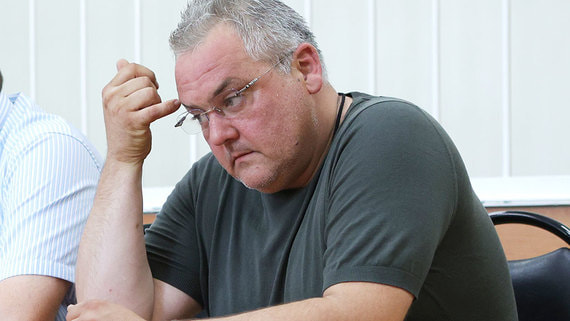The former vice-governor of the Belgorod region Polezhaev was detained in a bribery case
[ad_1]

Investigators detained the former vice-governor of the Belgorod region Konstantin Polezhaev on suspicion of taking a bribe on an especially large scale – 17 million rubles. (part 6 of article 290 of the Criminal Code of the Russian Federation). In 2015–2019 Polezhaev was the head of the administration of Belgorod, since 2019, even during the reign of Evgeny Savchenko, he took the post of vice-governor. The current head of the region, Vyacheslav Gladkov, fired Polezhaev on July 4, explaining this by the poor organization of work to restore Shebekino and Novaya Tavolzhanka, which were shelled by Ukraine.
According to investigators, Polezhaev in 2022 and 2023. received two cars from the director of one of the construction companies in the region for “assistance in the acceptance of work” for the construction of wastewater treatment plants and for concluding contracts with this company in the housing and communal services sector. The Investigative Committee of Russia clarified that “the crimes were revealed in the course of carrying out operational-search activities by employees of the Federal Security Service of Russia in the Belgorod Region, who provide operational support in a criminal case.”
The ex-mayor of Belgorod Anton Ivanov (2021-2022) was detained by the FSB under a similar article – suspicion of bribery on an especially large scale. Gladkov, in turn, explained that Ivanov’s dismissal followed a series of unfulfilled promises made to the residents of the city.
On March 20, another official from Savchenko’s team was detained. It was the former mayor of Stary Oskol (2018-2021) Alexander Sergienko, who was also accused of taking a large bribe. Investigators accused Sergienko of taking three bribes totaling 15 million rubles. According to law enforcers, the official used this money to help entrepreneurs obtain permits for rent and construction.
Savchenko was the governor of the Belgorod region for almost 27 years – from 1993 to 2020. This is a record among all the heads of subjects in the history of Russia. On September 22, 2020, he was approved by the representative of the regional legislative body in the Federation Council.
In the Belgorod region, over the long years of Savchenko’s governorship, a “strong and closed elite” has developed, notes political analyst Rostislav Turovsky. According to him, Gladkov had to either come to terms with her influence, or radically change the government. “Given the support of Gladkov in the Kremlin and the corruption of the old elite, it was decided to take the second path. Moreover, taking into account the fact that we are talking about a complex border region, Gladkov is simply obliged to create the image of a strong leader, which is what he does, ”Turovsky said.
“Often a heavyweight governor is a factor that limits zeal towards his subordinates. The security forces are more likely to dig under a weak governor than under a strong one. With the departure of Savchenko, the political roof ceased to function,” says political scientist Alexander Kynev.
Turovsky also drew attention to the arrests of Belgorod businessmen who worked during Savchenko’s time – Gennady Bobritsky and Alexei Tebekin. Polezhaev’s case only continues a long-established trend, the expert concluded.
In addition, on July 6, the Belgorod Regional Duma granted applications for the early termination of the powers of three deputies: Olga Pavlova, Elena Bondarenko and Valery Sergachev, who in the past held the posts of chairman, first deputy chairman and deputy chairman of the Legislative Assembly, respectively. All of them left their leadership positions in April 2022 amid a high-profile scandal with the distribution of Savchenko’s book “Shock”, in which he referred to the Gospel of Elizabeth by Nikolai Monoston, recognized as extremist.
The detention of vice-governors is now taking place in other subjects – the Ryazan region and St. Petersburg, recalled Alexei Makarkin, vice president of the Center for Political Technologies. “Officers now do not have unconditional immunity: current and former vice-governors and mayors are detained equally often,” Makarkin concludes.
[ad_2]
Source link








